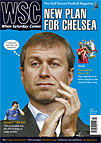 They reached European semi-finals in five consecutive seasons in the 1990s, but Paris Saint-Germain are in a sustained slump. Their fans aren't making them very popular either, writes James Eastham
They reached European semi-finals in five consecutive seasons in the 1990s, but Paris Saint-Germain are in a sustained slump. Their fans aren't making them very popular either, writes James Eastham
Sympathy for Paris Saint-Germain is often in short supply in France, yet you had to feel a little sorry for them after the 2008 French Cup final. They dominated but ended up losing 1-0 to Lyon in extra time. It was, admitted winning goalkeeper Gregory Coupet, “un joli hold-up”.
The event brought to an end the most dramatically disappointing season in PSG’s history. They flirted with disaster from the outset, as last summer’s ambition of a top-six finish gave way to a relegation battle that ran until the final day. Their final position of 16th – the lowest since accession to the top flight in 1974 – came after 15th last year.
For a club proud to have never been relegated, the pressure of fighting to stay out of the bottom three became almost too much to bear during the run-in. President Alain Cayzac, a board member since 1986, resigned on April 21, a day after fans trashed left-back Sylvain Armand’s Porsche and daubed threats of violence on the walls of PSG’s training ground following a 3-0 defeat at Caen. It wasn’t the first such incident: last December fans left a menacing letter at left-winger Jérôme Rothen’s home and damaged his car. Little wonder the players often looked petrified on the pitch.
So what happened? The decision to forego expensive signings last summer in favour of youth-team players sounded admirable until it became apparent the youngsters weren’t ready to play first-team football every week. But by then it was too late, as PSG were left with a squad too small and simply not good enough. Efforts to attract new talent in January floundered when Caen’s France Under-21 striker Yoan Gouffran reneged on a gentleman’s agreement to join PSG, fearing a move to the capital would harm his sporting prospects. It was hard to argue come May, when Gouffran’s Normandy club finished the season eight points and five places above PSG.
The season has further undermined Paul Le Guen’s reputation. Working with a small squad hindered him, but the players’ chronic lack of confidence and a tally of four points from 17 games in which they conceded the opening goal raise questions about him. During three consecutive title-winning seasons at Lyon his blank gaze was seen as a mask hiding managerial secrets. Nowadays observers wonder if there’s actually anything going on behind the eyes.
The most shameful moment of ten miserable months came during the League Cup final against Lens at the Stade de France on March 29. PSG won 2-1, but some fans unfurled a banner alluding to a recent box-office smash film in France, labelling Ch’tis (the nickname for people from the Nord-Pas-De-Calais region, where Lens lies) “paedophiles, jobless and inbreds”. The banner provoked national outrage, with President Nicolas Sarkozy, who was watching from the stands, voicing his disapproval. PSG were banned from next season’s competition and Boulogne Boys, their most notorious fans’ group, disbanded. The incident provoked funny ripostes across the country – Nice fans displayed the message “Welcome to Nice – home of petty thieves, mafiosi, hookers and drug addicts” when Lille, also from Nord-Pas-De-Calais, came to town.
For PSG, the first step towards getting anywhere near the success they enjoyed in the 1990s would be stability in the boardroom. Jérôme Alonzo, the club’s longest-serving player, pointed out the day before the French Cup final that he has worked “under five coaches and as many presidents” during seven years at the Parc des Princes.
Whatever PSG’s future holds, it will occur without Pauleta. The club’s all-time leading scorer, with 109 goals in 209 games, played his final game in the French Cup final. He was already a Ligue 1 top scorer on his arrival from Bordeaux in 2003. His replacement next season will be Guillaume Hoarau, who has just finished as Ligue 2’s top scorer with Le Havre. For PSG, that’s a depressing reality.
From WSC 257 July 2008